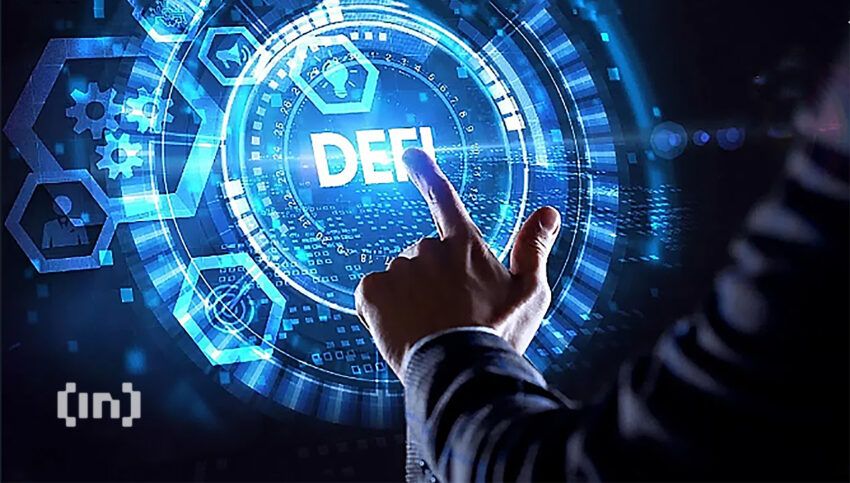BeInCrypto anticipates that decentralized finance (DeFi) will develop in terms of financial integration and personal identity over the coming year.
While cryptocurrencies and Web3 developments flourished in 2021, including DeFi, the past year saw these advances retract. Crypto valuations plummeted, causing many companies to fold, which led to further collapses and revelations of massive fraud. Yet, as DeFi has persisted, these events helped shape how it will develop over the course of the next year.
Centralized Exchange Failure
This year saw the failure of several centralized exchanges (CEXs), most notably the collapse of Sam Bankman-Fried’s FTX. As customers face a lengthy, uncertain process to reclaim their assets, many have become wary of these platforms’ lack of transparency and control. Consequently, decentralized exchanges (DEXs), a prominent feature of DeFi, have a great deal of potential for growth.
Although DEXs are often complex and require more due diligence from the average user, they transparently enable them with complete control. Rather than surrender their funds to a corporation, users have full visibility of how the platform is storing and investing their assets. Therefore, 2023 could potentially be a breakout year for DEXs, with potentially more innovative functions coming to applications and platforms.
Decentralizing Finance
Similarly, a greater number of investors will also begin to grasp the distinction between DeFi and its traditional, centralized counterpart. One reason is the relative ease with which claims have been refunded through DeFi protocols. For instance, the only creditors who managed to reclaim their assets did so through smart contracts. This was the case when Celsius and Alameda Research repaid their loans to access collateral they posted to borrow dollars.
Through the use of smart contracts, DeFi transactions are trustlessly and objectively intermediated utilizing cryptographic methods. Meanwhile, in CeFi, transactions are subjectively intermediated by humans, as are any failures, which are usually due to human error. Unlike in the case of FTX, for example, smart contracts do not require the mediation of external third parties.
Institutional Integration
As investors begin to reckon with the potential of utilizing smart contracts, there will likely be a greater integration of DeFi within CeFi. For instance, JPMorgan has made great strides in its blockchain-based developments through its devoted entity Onyx. The investment bank also made its first DeFi transaction earlier this year, in partnership with the Monetary Authority of Singapore.
Many also believe that the size of the FTX collapse will expedite legislation that could speed up blockchain technology adoption. To this end, the existing infrastructure of CeFi would enable institutions to interact with DeFi applications while remaining compliant. Steps taken by JPMorgan and other financial institutions this year portend greater integration in the coming one.
Decentralized Identity
Yet, as CeFi finds ways to further integrate blockchain-based methods, DeFi will also play a central role in the development of digital identities. This past year, several tools emerged that explored the interaction between social networks, reputation, and decentralized identities, including projects such as soulbound tokens, ENS, POAPs and Lens. This focus on reputation and identity is consequently likely to increase in 2023.
This will also be facilitated by the increased utilization of digital wallets and non-fungible tokens (NFTs), both of which have found greater use cases in the past year. For instance, the public gained greater awareness of digital wallets this year through their introduction by large social media companies, such as Reddit, Instagram and Twitter. As of Nov. 2022, roughly 80 million crypto wallets have been created, some 6% of which have interacted with DeFi. The trend of increasing wallet adoption would therefore readily contribute to DeFi’s growth next year.
Meanwhile, as unique identifiers, NFTs will also play a role in the DeFi helping to establish decentralized identities. For example, users could one day contribute an asset’s NFT as liquidity to a decentralized exchange’s liquidity pool. They could also borrow cryptocurrency against that NFT to invest in other yield-bearing products.
In addition to direct DeFi application, NFTs could also see use in tokenizing licenses and academic credentials. Verifiable credentials will also become a standard for off-chain credentials and attestations, with the first iteration of such scalable reputation systems being built using tools such as MetaMask Snaps, DIDs and VCs.
Disclaimer
In adherence to the Trust Project guidelines, BeInCrypto is committed to unbiased, transparent reporting. This news article aims to provide accurate, timely information. However, readers are advised to verify facts independently and consult with a professional before making any decisions based on this content. Please note that our Terms and Conditions, Privacy Policy, and Disclaimers have been updated.


